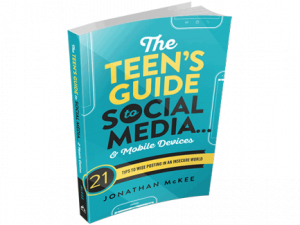
When Your Kid Desperately Wants to be “Liked”
Jonathan McKee
Christina got her smartphone when she was 11—one year later than the average young person gets a smartphone in America. She immediately downloaded Snapchat, Instagram and Tik Tok, the three apps that most her friends frequented, lying about her age to sign up with all three.
Mom and Dad never noticed.
Her parents also neglected to notice Christina charged her phone by her bedside every night, set on vibrate. At first the phone just kept her up an extra 30-45 minutes before she faded off to sleep; but soon she found herself waking up several times throughout the night to check social media, not uncommon by any measurement. In fact 79% of teenagers bring their phones in their bedroom with them each night and fall into the same rut.
When her iPhone first pushed the “screen time” upgrade last fall sending her a weekly report of her average daily screen time. . .she was a little surprised:
5 hours 33 minutes.
Not as surprised as her parents when the school counselor called. “I’m concerned about Christina. She’s showing signs of anxiety. I know a counselor I’d like to recommend.”
The pressure to be liked
A decade ago when kids were texting three thousand-plus messages per month parents were concerned about their phone bills. Five years ago when kids began “Snapping” pics to each other parents were worried about their kids’ innocence. But now that social media follows the overwhelming majority of teenagers literally everywhere they go—school, church, the bathroom, to bed at night—parents are worried about their kids’ mental health. . .and they have good reason to be concerned.
Anxiety, depression and teen suicide are at an unprecedented high, and almost every expert chiming in on the subject links this to screen time and social media. In fact experts like Dr. Jean Twenge dispute those who dismiss the connection between screen time and mental health. “Don’t believe them,” she says. Simply said, the more time you spend online, the more unhappy and depressed you are.
Is it surprising? We’ve handed our kids devices that remind them exactly how “liked” they are at any moment. This has never been good for their mental health. Maybe that’s why Instagram began a test literally last week hiding the number of “likes” a user’s post receives in efforts to create a “less pressurized environment.”
Adolescence creates enough pressure already. Do we need a digital reminder?
So what can moms and dads do to help their kids feel better about self?
A few weeks ago I wrote an article to youth leaders providing them with some advice to build the self esteem of the students they work with. Let’s look specifically at what parents can do.
Let’s start with what we know. What are some of the facts you wish your kids understood about their own mental health and feelings about self?
Wouldn’t it be cool if our kids knew. . .
- Our identity is in Christ, and that takes the focus off of us and onto Him. Hence, the more we focus on Him, the less we worry about us.
- Too much tech time is linked to depression. Heavy users of digital media (over two hours a day) are twice as likely to be depressed as light users.
- Sleep deprivation increases anxiety and depression. Teens are four times as likely to be depressed when they’re sleep deprived.
- When we are given the opportunity to empathize and/or serve others we become less focused on self.
So what can we do to help our kids learn these truths and help them feel better about themselves?
4 Ways to Build Your Kid’s Self-Esteem
1. Limit screen-time
When Christina spends 3 to 5 hours a day soaking in social media, she often begins to feel sad that she doesn’t have what many of the people she follows have:
Megan has a new puppy. I don’t have a new puppy.
Joseph just moved to a brand new house with a pool. I don’t have a pool.
Taylor is at the lake with her friends lying in a bikini. I wish I looked that good in a bikini.
The more Christina soaks in the images others post, the more Christina believes she needs these “perceived realities” to be happy.
But social media can also portray many risky behaviors like substance abuse, sexual behaviors, self-injury or eating disorders. The American Academy of Pediatrics (AAP) notes, “peer viewers of such content may see these behaviors as normative and desirable.”
It’s no surprise AAP suggests families limit hours of media use each day, recommending no devices in bedrooms at night, and encouraging “media-free” times together as families. . . which leads me to my next strategy. . .
2. Suggest a “media-fast”
Last year researches conducted a study about young people and their devices and were surprised to discover almost 70% of 13-18-year-olds said they “would like to spend more time socializing face to face rather than online.”
So why not challenge them:
“Do you think we could go a day without any digital media?”
“How about a week?”
Don’t just challenge them—join them. Throw in a little bit of motivation if you must. Throw a hondo on the table and say, “A hundred bucks to the person in this family who can last the longest without entertainment media this month!”
You might be surprised with the results. Kids who break free from the grip of their smartphone always show greater rates of satisfaction. In fact, research has never been so clear:
Teens who spend more time than average on screen activities are more likely to be unhappy, and those who spend more time than average on nonscreen activities are more likely to be happy.
So don’t be scared to give your kids a nudge in that general direction. Maybe you can lead by example.
But remember that self-esteem isn’t just about what you avoid. . .
3. Remind your kids who they are
Have you talked to your kids about their identity in Christ? Wouldn’t it be cool if kids understood not only how valuable they are to God, but who they are in Christ?
If your kids have put their faith in Jesus then they don’t have to get caught up in “self.” That’s the world’s thinking. “Self” has been “crucified with Christ. It is no longer I who live, but Christ lives in me.” (Galatians 2:20, NLT)
Interesting enough, when kids spend excessive time plugged into entertainment media, they’ll hear plenty of distracting messages about who they are or where happiness comes from: popularity, good looks, instant gratification. The best way to counter these lies is to be proactive about teaching them Biblical truth. Consider Colossians 3:
2 Think about the things of heaven, not the things of earth. 3 For you died to this life, and your real life is hidden with Christ in God. (Colossians 3:3-4, NLT)
One of the most effective ways I find to help kids engage in meaningful conversations about their identity is through music. Young people love music and many songs provoke feelings about ‘self’. We can use these songs to point them to God’s word. Luckily we at TheSource4Parents.com provide free music discussions complete with scripture and “3 questions you can ask your kids in the car.” Here’s a few good ones that springboard conversation about self esteem:
Scars to Your Beautiful, by Alessia Cara
When you open up God’s word you help your kids understand their incredible value by putting things in perspective. Like David Crowder sings:
You make everything glorious
And I am Yours
What does that make me?
(another fantastic “old school” music discussion)
When kids begin to recognize their identity in Christ, they tend to become aware of their strengths or giftedness. And if you want to see a kid really shine. . .
4. Give your kids an opportunity to use their strengths/gifts
We live in a very interesting time right now. On one hand young people have never been so inundated with messages of “just do you” and “you just gotta do what’s best for you!” (Self-centeredness 101) At the same time young people have been raised earning hours as a volunteer and following celebrities who want to “give back.” Help homeless horses. Save sick seagulls. Serving is “in.” An interesting by-product of this culture is that kids want to make an impact (and post a picture on Insta of themselves doing it).
Give your kids opportunities to serve like Christ served. Take your family to a homeless shelter or join with your church or other families and organize a neighborhood cleanup day. Do something where your kids get an opportunity to be a light for Jesus through acts of service. When kids are given the opportunity to help others, they typically experience empathy. Highly empathetic people report greater self-esteem and a deeper sense of purpose than those who report lower levels of empathy. But more than that, serving like Christ builds your identity in Christ.
Service opportunities open another door that helps kids’ self-esteem.
In a world where anxiety, depression, and teen suicide are at an unprecedented high, it’s never been a more perfect time to build into our kid’s self-esteem.
The little device in their pocket is providing all kinds of lies about who they are. Wouldn’t it be nice if someone was telling them the truth?
What are you waiting for?
Which of these four practices might you try tonight?

OR FOR MORE ON THE SUBJECT OF SOCIAL MEDIA, SCREEN TIME AND THE PRESSURE TO BE LIKED, TAKE A PEEK AT JONATHAN McKEE’S EXTREMELY HELPFUL BOOK, THE TEEN’S GUIDE TO SOCIAL MEDIA & MOBILE DEVICES
Jonathan McKee
Jonathan McKee is the author of over twenty books including the brand new The Guy's Guide to FOUR BATTLES Every Young Man Must Face; The Teen’s Guide to Social Media & Mobile Devices; If I Had a Parenting Do Over; and the Amazon Best Seller - The Guy's Guide to God, Girls and the Phone in Your Pocket. He speaks to parents and leaders worldwide, all while providing free resources for parents on his website TheSource4Parents.com. Jonathan, his wife Lori, and their three kids live in California.



